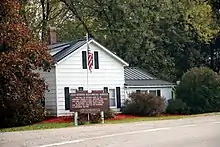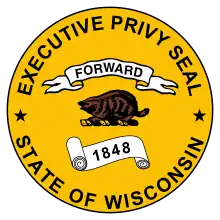George Wilbur Peck | |
|---|---|
.jpg.webp) | |
| 17th Governor of Wisconsin | |
| In office January 5, 1891 – January 7, 1895 | |
| Lieutenant | Charles Jonas |
| Preceded by | William D. Hoard |
| Succeeded by | William H. Upham |
| 29th Mayor of Milwaukee | |
| In office April 1890 – November 11, 1890 | |
| Preceded by | Thomas H. Brown |
| Succeeded by | Peter J. Somers |
| Personal details | |
| Born | September 28, 1840 Henderson, New York, U.S. |
| Died | April 16, 1916 (aged 75) Milwaukee, Wisconsin, U.S. |
| Resting place | Forest Home Cemetery, Milwaukee |
| Citizenship | United States |
| Political party | Democratic |
| Spouse | Francena Rowley Peck |
| Parents |
|
| Alma mater | Union College |
| Profession | Writer politician |
| Military service | |
| Allegiance | |
| Branch/service | Union Army |
| Years of service | 1863–1866 |
| Rank | |
| Unit | 4th Reg. Wis. Vol. Cavalry |
| Battles/wars | American Civil War |
George Wilbur Peck (September 28, 1840 – April 16, 1916) was an American writer and politician from Wisconsin. He served as the 17th governor of Wisconsin and the 9th mayor of Milwaukee.[1]
Biography

Peck was born in 1840 in Henderson, New York, the oldest of three children of David B. and Alzina P. (Joslin) Peck.[2] In 1843, the family moved to what is now Cold Spring, Wisconsin. Peck attended public school until age 15 when he was apprenticed in the printing trade. He married Francena Rowley in 1860 and they had two sons. In 1863 he enlisted in the 4th Wisconsin Cavalry Regiment as a private. He was taken prisoner and held at Libby Prison in Richmond, Virginia. After he was released in a prisoner exchange, he was appointed to the United States Military Academy by Abraham Lincoln. He was promoted to lieutenant and served until the regiment mustered out in 1866.[3]
Peck became a newspaper publisher who founded newspapers in Ripon and La Crosse, Wisconsin. His La Crosse newspaper, The Sun, was founded in 1874. In 1878 Peck moved the newspaper to Milwaukee, renaming it Peck's Sun. The weekly newspaper contained Peck's humorous writings, including his famous "Peck's Bad Boy" stories.[4]
In the spring of 1890, Peck ran for mayor of Milwaukee. A Democrat, Peck was elected despite a Republican majority in the city.[4] The state's Democratic leaders took notice and made Peck the party's nominee for the 1890 gubernatorial race. Peck won the election, beating the incumbent William Hoard, and resigned as Milwaukee's mayor on November 11, 1890. He was reelected as governor in 1892, defeating Republican John C. Spooner, but lost a third term to William Upham in 1894. He ran again in 1904 but lost to the incumbent Robert M. La Follette Sr.[3]
Peck died in 1916 in Milwaukee at age 75 of Bright's disease and was buried at Forest Home Cemetery.[5] After his death, his "Peck's Bad Boy" writings became the basis for several films and a short-lived television show, including Peck's Bad Boy and Peck's Bad Girl.[6][7]
His former home in La Crosse is located in what is now known as the 10th and Cass Streets Neighborhood Historic District.
Works
- Peck's Fun, 1879 (copy)
- Peck's Sunshine, 1882 (copy)
- Peck's Bad Boy and His Pa, 1883
- Will He Marry Her? A Domestic Drama for Home Reading, 1885
- How Private Geo. W. Peck Put Down the Rebellion, 1887 (copy)
- Pecks Irish Friend Phelan Geoheagan 1887
- Peck's Uncle Ike and the Red Headed Boy, 1899 (copy)
- Peck's Bad Boy Abroad, 1904 (copy)
- Peck's Bad Boy with the Circus, 1905 (copy)
- Peck's Bad Boy with the Cowboys, 1907
- Peck's Bad Boy in an Airship, 1908 (copy)
Peck's Bad Boy and the Groceryman 1883
References
- ↑ "Peck, George Wilbur 1840 - 1916 - Wisconsin Historical Society". Retrieved March 31, 2017.
- ↑ Greasley, Philip A. (2001). Dictionary of Midwestern Literature, Volume 1: The Authors. Indiana University Press. p. 406. ISBN 0253108411.
- 1 2 Wisconsin. Legislature. Senate (1917). Journal of Proceedings. Wisconsin. Legislature. p. 149.
george wilbur peck died April 16, 1916.
- 1 2 Charles Rounds (1918). "George W. Peck". Wisconsin Authors and Their Works. Madison: Parker Educational Company. pp. 397–399. Retrieved March 30, 2017.
{{cite book}}:|website=ignored (help) - ↑ "Historical People". Forest Home Cemetery. Archived from the original on April 3, 2016. Retrieved May 17, 2014.
- ↑ "Academic Dictionaries and EncyclopediasPeck's bad boy". Wisconsin Electronic Reader. Retrieved May 17, 2014.
- ↑ Leszczak, Bob (2012). Single Season Sitcoms, 1948–1979: A Complete Guide. McFarland. p. 154. ISBN 9780786493050.
External links
- Works by George Wilbur Peck at Project Gutenberg
- Works by or about George Wilbur Peck at Internet Archive
- Works by George Wilbur Peck at LibriVox (public domain audiobooks)

- George W. Peck at IMDb
- George Wilbur Peck at Find a Grave
- Many George W. Peck stories read in Mister Ron's Basement Podcast, now indexed for convenience
- George W. Peck
